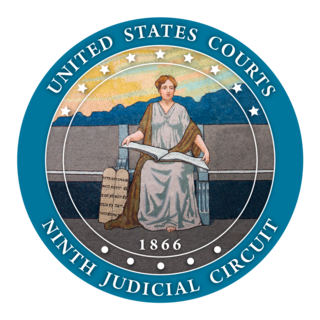Courts of Nevada include:
Contents
- State courts of Nevada

Federal courts located in Nevada
Courts of Nevada include:

Federal courts located in Nevada
Jurisdiction is the legal term for the legal authority granted to a legal entity to enact justice. In federations like the United States, the concept of jurisdiction applies at multiple levels.

The United States Court of Appeals for the Ninth Circuit is the U.S. federal court of appeals that has appellate jurisdiction over the U.S. district courts for the following federal judicial districts:

The Supreme Court of Nevada is the highest state court of the U.S. state of Nevada, and the head of the Nevada Judiciary. The main constitutional function of the Supreme Court is to review appeals made directly from the decisions of the district courts. The Supreme Court does not pursue fact-finding by conducting trials, but rather determines whether legal errors were committed in the rendering of the lower court's decision. While the Court must consider all cases filed, it has the discretion to send appeals to the Nevada Court of Appeals for final resolution, as well as the power to determine the jurisdiction of that court.

The government of the U.S. state of Oregon, as prescribed by the Oregon Constitution, is composed of three government branches: the executive, the legislative, and the judicial. These branches operate in a manner similar to that of the federal government of the United States.

The Government of Tennessee is organized under the provisions of the 1870 Constitution of Tennessee, first adopted in 1796. As set forth by the state constitution, administrative influence in Tennessee is divided among three branches of government: executive, legislative, and judicial.
Courts of Montana refers to courts of law in the U.S. state of Montana. They include:
Courts of Wisconsin include:
The Commonwealth of Massachusetts is governed by a set of political tenets laid down in its state constitution. Legislative power is held by the bicameral General Court, which is composed of the Senate and House of Representatives. The governor exercises executive power with other independently elected officers: the Attorney General, Secretary of the Commonwealth, and Auditor. The state's judicial power rests in the Supreme Judicial Court, which manages its court system. Cities and towns act through local governmental bodies to the extent that they are authorized by the Commonwealth on local issues, including limited home-rule authority. Although most county governments were abolished during the 1990s and 2000s, a handful remain.

The Supreme Court of the United States handed down nine per curiam opinions during its 2016 term, which began October 3, 2016 and concluded October 1, 2017.
Lidia Shenade Stiglich is an American attorney and jurist serving as a justice of the Supreme Court of Nevada since 2016. She was appointed by Governor Brian Sandoval on November 10, 2016.

The Nevada general election, 2018 was held on Tuesday, November 6, 2018, throughout Nevada.
The Nevada Judiciary is the judicial branch of the Government of Nevada, which is responsible for applying the Constitution and law of Nevada. It consists of the Supreme Court, Court of Appeals, district courts, justice courts, and municipal courts. The Supreme Court oversees the administration of the judiciary.

A general election was held in the U.S. state of Nevada on November 3, 2020. To vote by mail, registered Nevada voters must ensure each ballot is postmarked by November 3 and received by November 10, 2020.